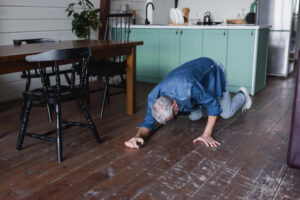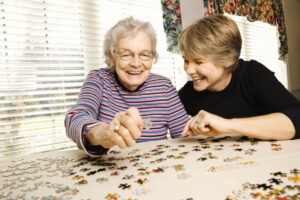Humans use touch as the language of compassion; a held hand or a hug often serves as the best way to express profound feelings. Research suggests that the sense of touch plays a fundamental role in human communication and even physical health.
National Hugging Day, observed on Jan. 21, recognizes the importance of one form of human touch. Organizers of the international event note that hugging has many benefits, including relieving stress, expressing caring and concern for another person, and promoting the release of the happiness-inducing hormone oxytocin. In addition, hugs are associated with health benefits such as lessening symptoms of illness and improving blood flow.
For individuals with dementia, human touch plays an important role in promoting overall well-being. Research has found that just five minutes of hand massage can induce a physical relaxation response and reduce levels of cortisol, a hormone released during times of stress. Massage also has been found to raise levels of serotonin, a neurochemical that promotes feelings of calm and reduces anxiety.
Touch as Dementia Therapy
In recent years, a national movement has sought to reduce the use of unnecessary medications for individuals with dementia, instead using non-drug strategies and approaches to improve behavioral symptoms. Human interaction, including skilled touch, has become more widely used as an effective intervention.
Skilled human touch, often in the form of massage, combines medical technology with personal interaction so important for improving outcomes among people with dementia.
Need assistance now? Click here to contact us for help or schedule a visit.
Physical Effects of Human Touch
An absence of human touch can cause negative physical and emotional effects on older adults. Without human touch, elders are at increased risk of anxiety, feeling isolated, lowered trust in care partners, and decreased awareness of the senses.
Elders with serious medical conditions are among the groups that benefit the most from skilled touch, and studies have shown that touch communicates reassurance and safety to them.
Research has found that a brief hand massage for a person with dementia can result in significantly lower levels of agitation for as long as an hour following the session. Such massage also has been found to deepen relationships between family care partners and individuals with dementia.
In addition, foot massage has been found to promote deep relaxation, reduce pain and anxiety, encourage sleep, and communicate support and comfort for individuals with dementia. One study demonstrated that two weeks of daily foot massages lowered agitation, and the positive changes lasted for two weeks or more even without the massages continuing.
For people with dementia, touch serves as a universal language to elicit positive behaviors and promote feelings of safety and well-being. The caring team members at Elder Care Alliance incorporate skilled human touch based on the latest research as part of our comprehensive approach to memory care.




















